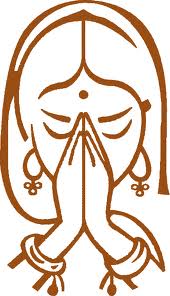
Krishna enlightens Arjun
Credit: International Society For Krishna consciousness – ISKCON
The Krishna of the Hindu epic the Mahabharat is no longer the adolescent, mischievous romantic who stole the hearts of the village maidens and companions. The Avatar has now assumed kingship and matured into an astute diplomat. He is here engaged in playing the role of mediator between estranged cousins, each representing on the one hand the forces of clarity and on the other ignorance and darkness. When his mediation fails he joins the ranks of clarity and good against those of injustice, arrogance, hauteur, deceit, subterfuge, atrocity, brutality, rape, intemperance, intolerance, wrath and perverted wisdom.
On the battlefield he is the charioteer of the hero Arjun, the embodiment of righteousness and virtue. The image of Arjun, the upright and humble warrior on his chariot with his divine charioteer holding the reins, is etched indelibly in the popular Hindu psyche, with allegorical connotations: Arjun is the individual Soul(Atma). the chariot is his body, the horses are his senses, the charioteer is his conscience, the Universal Essence, the Super-soul (Paramatma), incarnated as the Avatar Krishna. The forces of good and evil are arraigned against each other on the battlefield of earthly existence.
It is in such a setting that Arjun is suddenly overcome by remorse, doubt and confusion ( as we all do from time to time) over the ethics of confronting his cousins in warfare and refuses to fight when the bugles (conches) have already sounded. He begins the dialogue by questioning the Avatar. Through the dialogue emerge Krishna’s seminal discourses on numerous themes, including the myth of creation, the nature of the soul, the attributes of the Universal Essence, reincarnation, the theory of karma, the role of Nature, righteous action, the purpose of life and the path to liberation and enlightenment.
Below are only presented those verses which explain the nature of the Universal Essence (Brahma), the so called Godhead (Ishwara) and its counterpart the individual Soul (Atma). When Arjun asks his ‘friend’ and mentor the Avatar, time and again in the course of the dialogue, who He may indeed be, Krishna tells him all. The Gita (Song) is composed in exquisite verse in Sanskrit.
THE BHAGAVAD GITA
(THE SONG CELESTIAL)
– excerpts –
Arjun, the world is made up of the perishable and the imperishable,
Perishable are living creatures, the imperishable is the Self,
I am beyond both, the Supreme Self
Pervading the worlds as God.
The whole universe of the moving and the unmoving
Are joined together in Me,
The whole universe undivided, yet appearing divided
In its manifold diversity,
Are drawn together as one in Me.
I am therefore the same in all beings,
The imperishable in the perishable,
He who sees me everywhere and sees all in Me,
He is never lost.
I am the same towards all beings,
For me there are none hateful none dear,
But those who worship Me, I am with them,
And they are with Me.
The one who applies the same measure for all,
For pleasure and for pain, as he applies to himself,
That one is the best of men.
I am the origin of all, from me all things evolve.
After an age, all beings return to my nature
And issue forth again with another age.
I animate my Nature and creation occurs under her laws,
Nature produces the moving and the unmoving
Thus the worlds revolve.
I am Time, mighty and world consuming.
the supreme Universal Essence,
Neither Being nor Non-Being.
If the light of a thousand suns,
Should suddenly shine in the heavens
It would be like the light of my Being.
I am the father of the world, the mother,
The grand-sire, and the friend,
I am the goal, the supporter, the witness, the sanctuary,
The origin, the dissolution, the foundation
And the seed imperishable.
I am the taste in water, the radiance of the sun and the moon,
Manhood in man, the life force,
I am sweet fragrance in the earth, the brilliance of fire,
Austerity of the ascetics, intelligence of the intelligent,
Splendour of the splendid, might of the mighty.
Of secrets I am silence, I am wisdom of the wise,
Of sciences the science of the Self,
I am glory, fortune, memory and patience,
Of meters I am the beat of the universe,
Of seasons the season of spring, I am victory I am resolution,
I am the goodness of the good.
Of waters I am the ocean, of mountains the Himalayas,
The seed of all existence am I.
Whenever there is decay of virtue
And rise of anarchy, I embody Myself.
For the protection of the good,
Destruction of the wicked
and the establishment of righteousness,
I am born from age to age.
I am the Self seated in the hearts of all beings.
An eternal portion of Myself becomes
The eternal souls in the living world
Drawing to itself Nature’s five senses and the mind.
The soul is neither born nor does it die,
Unborn, eternal, constant and ancient.
When the Soul leaves the body,
It takes along the acquired qualities of a lifetime.
As a man casting off worn out garments, puts on new ones,
So the embodied one, casting off worn out bodies,
enters others that are new.
The Soul is stable, immovable, everlasting
It is not manifest, is unthinkable,and immutable, a marvel.
When the disciplined mind is fixed on the Soul,
Free from distraction of objects and desires,
Like a lamp which does not flicker in a windless place,
Attaining stillness, it beholds the Self
And is filled with joy.
Thus constantly holding the spirit in harmony,
It eventually senses the infinite Universal Essence
And with contact attains bliss.
He then sees himself, the same in all,
Sees me everywhere and all in Me.

Arjun and Krishna into battle against evil, confusion resolved
Credit ISKCON











